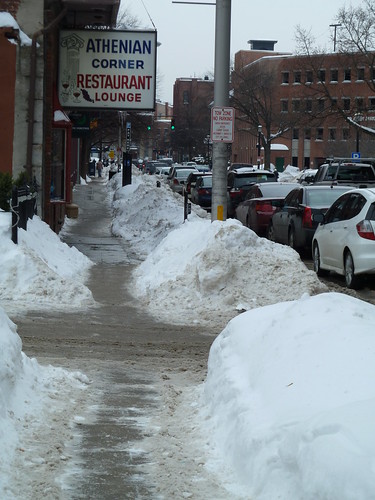The market price of on-street parking

Market Street in Lowell; February 2011
Harvard economist Edward Glaeser, one of the foremost urban thinkers in America today, has a provocative op-ed in the Globe. In “Best deal in town: on-street parking“, Glaeser examines the economics of urban parking. He contends that the because real estate is so valuable, the true cost of a parking space is quite expensive, but with municipal meters charging just $1 per hour for curbside parking, the entire community is subsidizing the select few who snag one of these spaces. He further observes that when you factor in the time spent hunting for curbside parking and the congestion and pollution it causes, curbside parking should be made more expensive than off-street parking. He doesn’t advocate eliminating curbside parking; he wants to let the free market price it. The added revenue, he contends, could fund improvements for pedestrians and bicyclists and other non-car drivers.
While Glaeser’s proposal is completely logical and even desirable, I laugh when I think of the debate that would ensue on the floor of the city council if something like this were ever proposed. One former councilor actually made the elimination of all downtown parking meters the centerpiece of his council tenure. Still, when you consider the traffic congestion that paralyzes the downtown at every evening rush hour, the thought of lessening the number of cars parked curbside starts making more sense in very practical terms. I doubt we’ll be having this debate anytime soon in Lowell, but it’s still good to get people thinking about it.
The streets are public ways. I actually think that if parking is allowed at all it should be free. However, I also think it’s reasonable to restrict street parking.
I agree with the article but disagree with Christopher:
First off, we have to allow parking. There aren’t too many easy ways to make the pedestrian experience better than to put a row of parked cars between you and traffic. Compare walking on Dutton Street to Merrimack Street. The other factor there is traffic speed, which parked cars help to reduce. Also, for businesses, having very close parking is a big win as is having two-way traffic.
As for pricing: People, if not charged enough, will hog metered spaces. People who are employees downtown or are residents would get there and keep the spots all day. This is totally unfair to everybody else. We see this already on evenings or weekends. That which is more desirable should be more expensive.
It bothers me that on weekends we see full parking spaces on streets and empty garages. It takes time to enter and exit the garages – we need to make people who do use the garage ideally stay in the garage for a long period of time. This means short-term parking needs to be on the street. This is why it is a fine to feed the meter in Lowell and many other places even though the city gets the same amount of money.
I think Lowell works perfect on weekdays: full garages and enough empty on-street spaces. It’s entirely possible to come downtown on a lunch break, park on Merrimack Street, and go back to work. On the weekend, it’s broken. Try a five-minute coffee run on a Saturday. We need to at least drop the price of the garage on weekends (it’s not as if it costs us anything extra to run a full over an empty garage) and maybe start enforcing the meters on Saturdays like we say we will (I’m less sure on this one). I think we should always be enforcing the two-hour limit on streets downtown, day or night.